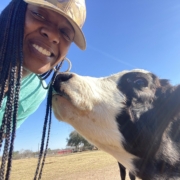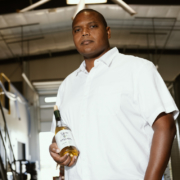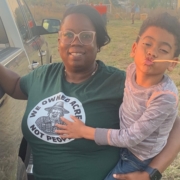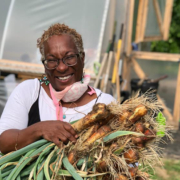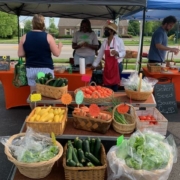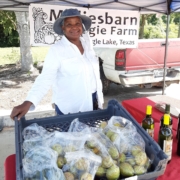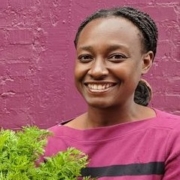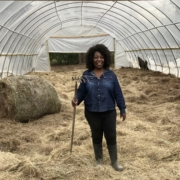Deydra King
Deydra King decided to leave the city and pursue ranching at her family ranch, S3 Legacy Ranch, located outside Luling, Texas. She has been ranching full-time for almost five years, primarily raising cattle. Through her ranching journey, Deydra has learned to maximize profits while taking care of the environment and advocating for the local community.
The ranch manages 220 acres and has two herds of cattle, Angus and Charbray. Recently, they have incorporated more sustainable agricultural practices, such as rotational grazing and cover cropping. They had great success with cover cropping, Deydra said—. it has resulted in additional forage for their cattle, improved grasses, allowed switching to spot spraying for weeds, and reduced the use of synthetic nitrogen fertilizer. Deydra manages the farm’s finances and the USDA programs the farm is participating in. She mentioned that they choose their management system by considering their profits. She always looks for ways to maximize profit, and the use of regenerative practices translates to cost savings for their operation.
Deydra is passionate about producer financial literacy, particularly after overcoming a challenge with the IRS. Before Deydra took over the ranch finances, her dad used to hire a CPA to take care of the ranch taxes. Unfortunately, the CPA did not maximize the available tax exemption for producers like her dad. The IRS placed a lien on several properties, which restricted their ability to get loans. Deydra began working with the IRS and a revenue agent to resolve the issue. Her goal was to not completely lose the property because land tenure for small-scale BIPOC producers is very important. This was no easy task, and she decided to “[learn] what the options were, [and] maximize those challenges as opportunities.” Ultimately, they decided to sell the property, file a Schedule F, and do a five-year tax reconciliation. This proved to be a fruitful strategy, and they were able to pay the IRS, replenish her dad’s retirement fund, and leave funds for future generations.
The greatest farming challenge in her region is climate and location. S3 Legacy Ranch, like many operations in Texas, is located in an area with oil fields. In these locations, there are operators coming and going, and there are a lot of surface lines. When these oil wells stop producing, the oil companies leave everything behind – surface lines, storage facilities, and water-retention areas. In return, ranchers like Deydra lose livestock every year. The surface lines also prevent producers from carrying out some management practices, such as tilling, and many don’t have the equipment like a no-till drill to carry on their operation. Additionally, when livestock dies from the oil infrastructure, the oil companies pay producers the minimum, and they don’t understand that one animal can breed and has added value. It is very frustrating for producers like Deydra because sometimes it becomes hard to hold oil companies accountable. As a response, Deydra writes letters to the oil companies and helps fellow ranchers to deal with oil and gas leases.
Deydra wishes she had learned about USDA subsidy programs and the financial aspect of ranching and private loans sooner. Through National Center for Appropriate Technology (NCAT) agriculture specialists, she has learned about regenerative agriculture and a systems way of managing the land. She has been able to attend Texas AgriLife workshops and learn about various subject matters. She also taps into programs at Alcorn State University, such as Woman in Agriculture. Additionally, she always keeps an eye out for USDA emails and news. The Texas State University Small Producers Initiative has provided Deydra the platform to conduct workshops about soil health, soil management, and rotational grazing. She describes this opportunity with Texas State University as very meaningful, since BIPOC representation in the farming community matters. While organizations like these are a great resource, Deydra would like to see more boots-on-the-ground outreach through farm tours. She mentioned that farm tours are comfortable and allow people to find familiarity with their enterprise and learn and exchange information.
Deydra has been working hard at advocating for her community and her family’s ranch. She has been successful at helping her parents and supplying technical and manual assistance to her neighbors. Regardless of everything she has accomplished, Deydra said she will feel successful when the soil and the ecosystem around her has been taken care of.

